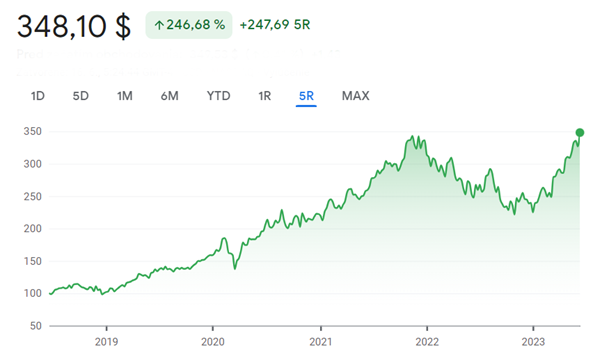It just a machine, you say, but lately it doesn't sound nearly as strange as it used to. I typed all the available food from the fridge into OpenAI's AI chatbot and voilà, I had several possible ways to make a meal. It worked. I didn't expect the AI to be able to reach into my stomach, but it was nice, even giving me precise instructions on how to season the rice so it would grow nicely. I'm not such a bad cook after all, but maybe that's the work of the artificial intelligence.
I looked at the market and was surprised at how well Microsoft is doing, having made a significant investment of USD 10 billion just a few months ago in OpenAI. At the moment, Microsoft is approaching a market capitalisation of USD 2.6 trillion and has also reached the highest stock value in its history, which is now 348.10 USD. Records have also been broken by Apple and Nvidia in recent days, which are at an all-time high. Thus, artificial intelligence is still benefiting from its trend and positively influencing investor sentiment, which is helping tech firms to make up for the unpleasant times of the past year. Microsoft has introduced many enhancements to its Bing browser and has also integrated ChatGPT into its Azure cloud services system. Even analysts at JPMorgan have expressed confidence in the potential of generative AI and see it as a catalyst for many software brands.
It has also found its place in the automotive industry, with Mercedes-Benz today announcing a test program in the United States aimed at using the ChatGPT bot to drive some luxury vehicles. Approximately 900 thousand vehicles with MBUX systems will receive the bot via the Mercedes app or as a voice assistant. Its services will include more natural responses, destination information or dinner recipe suggestions, for example. Drivers will thus be able to talk to their own car, make restaurant reservations or buy a cinema ticket while driving. Such a service also appeals to Amazon, which would like to introduce a similar service using its AI-equipped assistant Alexa.
When I look at all the enhancements that artificial intelligence brings, I'm having a play with an idea that has been presented in many science fiction movies and it's possible that it could become a reality. Artificial intelligence will replace humans. Yes, in some jobs it will replace them. Alphabet Inc, Google's parent company, advises its employees to be careful when using Bard software. According to the executives, they should not enter confidential information to the chatbot due to privacy concerns. Google aims to provide transparent information regarding the operation of its system and is aware of the risks that artificial intelligence brings. This cautious approach is in line with the security standard and it is currently expanding the availability of Bard to more than 180 countries and 40 languages, but has so far delayed the process in the European Union due to concerns about information leaks.
Until artificial intelligence is fully integrated into all digital systems, I will only use it to create cooking recipes. As for Microsoft shares, I am less scared of those, which is why I have invested in them, and I hope that they will be just as tasty in the future.

Microsoft's stock performance over the past five years. (Source: Google)*
* Past performance is no guarantee of future results.








